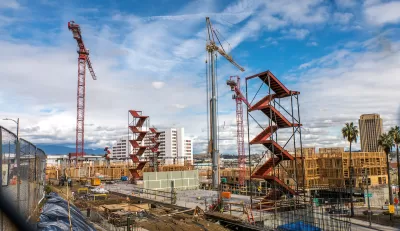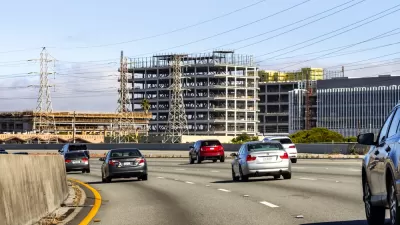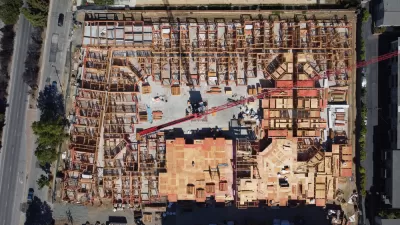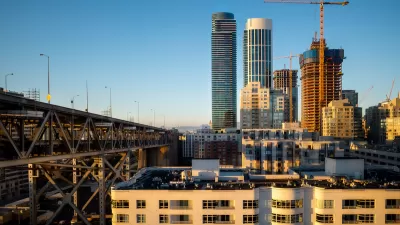The controversial law lets developers skirt local zoning rules in cities without state-approved housing plans.

California lawmakers want to curb the state’s ‘builder’s remedy’ law, an often overlooked state regulation that lets developers build projects that don’t conform to local zoning codes in cities without a state-approved housing element.
As Ben Christopher explains in CALmatters, “Despite its use as a hardball negotiating tactic by aggressive developers, no project has broken ground, much less finished, as a result of the builder’s remedy. That’s partially because relatively few developers are willing to make use of the confusingly-worded law for lack of legal certainty.”
State Assembly Bill 1893, authored by Assemblymember Buffy Wicks, would clarify and “modernize” the law, capping the size of projects and banning them in industrial zones. “The proposed overhaul, outlined in a newly amended draft of the bill published this morning, includes new perks for developers, textual edits to clear up how the law would apply and a provision to let developers who make use of other state laws allowing them to bypass environmental review and public hearing requirements to make use of builder’s remedy guarantees too.”
A second bill, AB 1886, would require an official sign-off from the California Housing and Community Development department.
The bills come in response to recent concerns over the vague — or in some cases nonexistent — limits of the law. Projects submitted under the builder’s remedy often get caught up in lawsuits, driving up costs and extending timelines. But “For ‘Yes In My Backyard’ activists who blame development-averse local governments for the state’s housing shortage, the builder’s remedy has been celebrated as the policy equivalent of the “F—- Around and Find Out” meme.”
FULL STORY: California’s most controversial housing law could get a makeover

Planetizen Federal Action Tracker
A weekly monitor of how Trump’s orders and actions are impacting planners and planning in America.

Congressman Proposes Bill to Rename DC Metro “Trump Train”
The Make Autorail Great Again Act would withhold federal funding to the system until the Washington Metropolitan Area Transit Authority (WMATA), rebrands as the Washington Metropolitan Authority for Greater Access (WMAGA).

DARTSpace Platform Streamlines Dallas TOD Application Process
The Dallas transit agency hopes a shorter permitting timeline will boost transit-oriented development around rail stations.

Supreme Court Ruling in Pipeline Case Guts Federal Environmental Law
The decision limits the scope of a federal law that mandates extensive environmental impact reviews of energy, infrastructure, and transportation projects.

Texas State Bills to Defund Dallas Transit Die
DART would have seen a 30% service cut, $230M annual losses had the bills survived.

Bikeshare for the Win: Team Pedals to London Cricket Match, Beats Rivals Stuck in Traffic
While their opponents sat in gridlock, England's national cricket team hopped Lime bikes, riding to a 3-0 victory.
Urban Design for Planners 1: Software Tools
This six-course series explores essential urban design concepts using open source software and equips planners with the tools they need to participate fully in the urban design process.
Planning for Universal Design
Learn the tools for implementing Universal Design in planning regulations.
Roanoke Valley-Alleghany Regional Commission
City of Mt Shasta
City of Camden Redevelopment Agency
City of Astoria
Transportation Research & Education Center (TREC) at Portland State University
US High Speed Rail Association
City of Camden Redevelopment Agency
Municipality of Princeton (NJ)





























